AI Governance Frameworks For Responsible AI
AI poses unique challenges for governance that must be directly addressed to mitigate risks and take advantage of opportunities. How are organizations developing AI governance frameworks, and what benefits and challenges have they experienced around AI governance?
One minute insights:
 Respondents to this survey are at organizations that addressed or plan to address
AI through a governance framework. Nearly half report that they have already
implemented their framework
Respondents to this survey are at organizations that addressed or plan to address
AI through a governance framework. Nearly half report that they have already
implemented their framework Skill gaps and unclear business impacts of AI impede implementation
Skill gaps and unclear business impacts of AI impede implementation Lack of AI governance has increased costs and led to failed initiatives for many
Lack of AI governance has increased costs and led to failed initiatives for many Most organizations where an AI governance framework is implemented have
an AI center of excellence involved in policy and procedure decisions
Most organizations where an AI governance framework is implemented have
an AI center of excellence involved in policy and procedure decisions For leaders with a framework in place, AI governance has increased the number of
successful AI initiatives, improved customer experience and increased revenue
For leaders with a framework in place, AI governance has increased the number of
successful AI initiatives, improved customer experience and increased revenue
Nearly half of respondent organizations have already implemented an AI governance framework, but skill gaps and unclear business impacts are common challenges
46% of respondents say their organization has an AI governance framework implemented, either as a dedicated framework (12%) or as an extension of other governance frameworks (34%). The majority (55%) of respondents say their organization has not yet implemented an AI governance framework, but most (40%) have started developing one.
Does your organization have an AI governance framework implemented?*
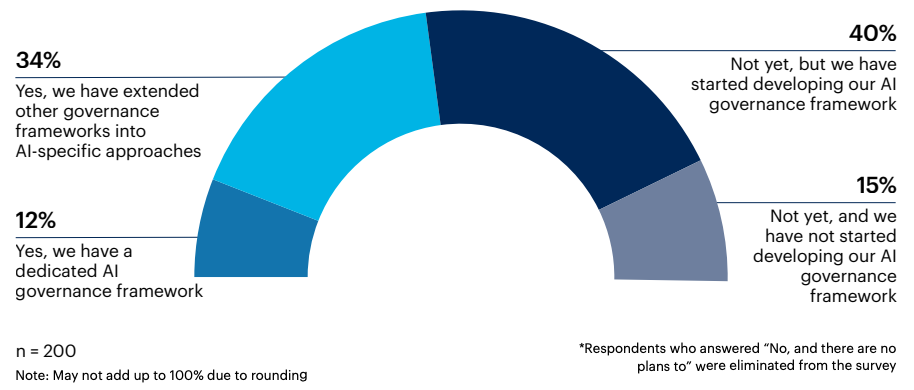
Among those respondents who identified challenges to implementing AI governance at their organization (n = 192), more than half (57%) said skill gaps have been one of the biggest challenges. Lack of clarity about AI’s business impacts (48%) and production-first mentality (37%) were also among the top challenges for many.
What have been the biggest challenges to implementing AI governance at your org? Select up to three.
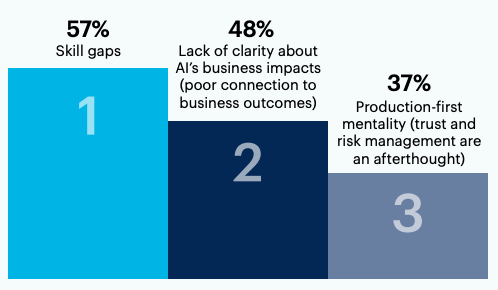
Lack of data governance 26% | Fragmented technologies 25% | Poor collaboration between business functions 22% | Lack of transparency for third-party AI solutions 20% | Poor data management 18% | Not enough legal pressure 16% | Other* 1%
n = 192
All respondents, excluding those who selected “We haven’t experienced any challenges” *Other: Limited use and risk to the organization currently
D&A and business strategy are among the main drivers for AI governance. When AI governance is lacking, increased costs is the most common negative impact
The main drivers for AI governance at respondent organizations include data and analytics strategy (59%), business strategy (57%) and executive interest (42%).
What are the main drivers for AI governance at your organization? Select up to three.
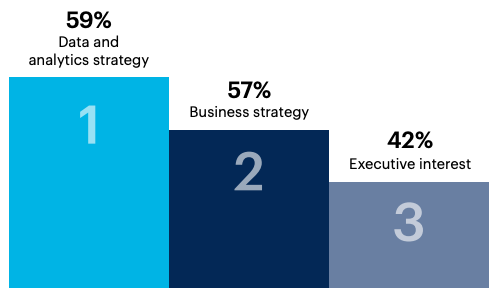
Employee interest 33% | Board interest 22% | Current laws and regulations 19% | Planned laws and regulations 14% | Other* 1%
n = 200
*Other: Cost controls
Leaders who were able to identify negative impacts experienced at their organization due to a lack of AI governance (n = 89) usually pointed to increased costs (47%), failed AI initiatives (36%) or decreased revenue (34%).
What negative impacts has your organization experienced due to lack of AI governance? Select all that apply.
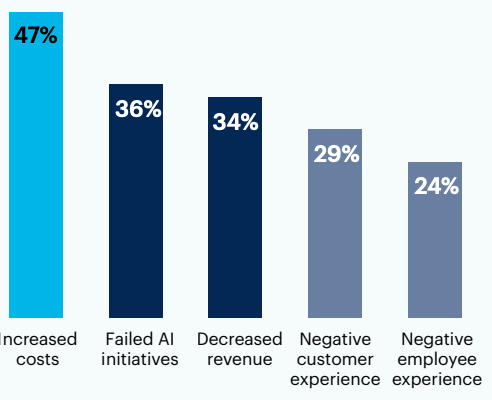
Brand damage 19% | Fines/lawsuits 18% | Other 0%
n = 89
All respondents, excluding those who selected “We have not experienced any negative impacts”, “Too early to tell” or “Not sure”
The greatest risks when AI governance is lacking or lagging
Question: What are the greatest risks to lack of or lagging AI governance?
Market will move exponentially, being late to the game will have substantial impact.
Poor business decisions are made as a result of lack of appropriate oversight.
The greatest risk is that AI will be used improperly and result in improper or unethical outcomes.
A system that shows bias, cannot provide meaningful insights, and essentially becomes more nuisance than effective tool.
An AI CoE is a common participant in determining policies and procedures for those that have implemented an AI governance framework
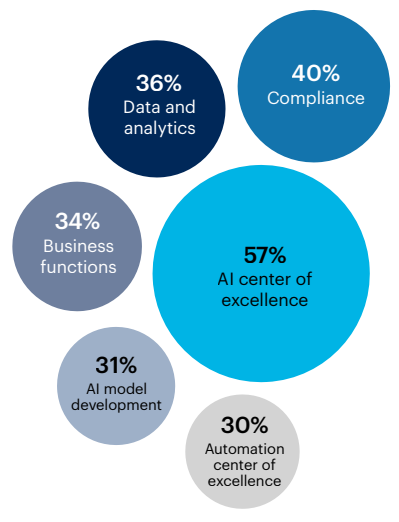
The majority (57%) of those whose organizations had already implemented an AI governance framework (n = 91) involved an AI center of excellence in determining AI governance policies and procedures at their organization.
Who is involved in determining AI governance policies and procedures at your org? Select all that apply.
Security 27% | Data and analytics center of excellence 25% | Legal 20% | Privacy 13% | Dedicated AI risk management o ice 12% | Other 0%
n = 91
Respondents who answered “Yes, we have a dedicated AI governance framework” or “Yes, we have extended other governance frameworks into AI-specific approaches” to the question “Does your organization have an AI governance framework implemented?”
Unique elements of AI governance according to respondents whose organizations have or are developing an AI governance framework
Question: What key differences should technology leaders keep in mind when it comes to governing AI as opposed to other technologies? Question shown only to those who answered “Yes, we have a dedicated AI governance framework”, “Yes, we have extended other governance frameworks into AI-specific approaches” or “Not yet, but we have started developing our AI governance framework” to the question “Does your organization have an AI governance framework implemented?”
Scope of solutions. AI is an emerging market for service delivery and as such not all use cases have been properly identified which will increase security risk
AI foundation is based on statistical reasoning and theory. As a result, the predictions and inferences of AI systems are approximations. To expect factual outputs is misguided. Grounding your governance strategy with this in mind will help affect the right decisions with ensuring AI is adopted at scale and at pace.
The learning aspect — instead of governing a process/procedure, you are in essence governing a "living thing" which means the rules need to be more directional than concrete.
Key differences are that this is an ever-evolving technology, with regulators rushing to catch up, so having the mindset that you will have to change what you are doing now.
At organizations that have implemented them, AI governance frameworks often cover AI-specific information governance and algorithm accountability and decision rights
60% of respondents with an AI governance framework who identified their standards and systems (n = 90) have established AI-specific information governance policies and 60% procedures as part of their framework.
What standards and systems have you established as part of your AI governance framework? Select all that apply
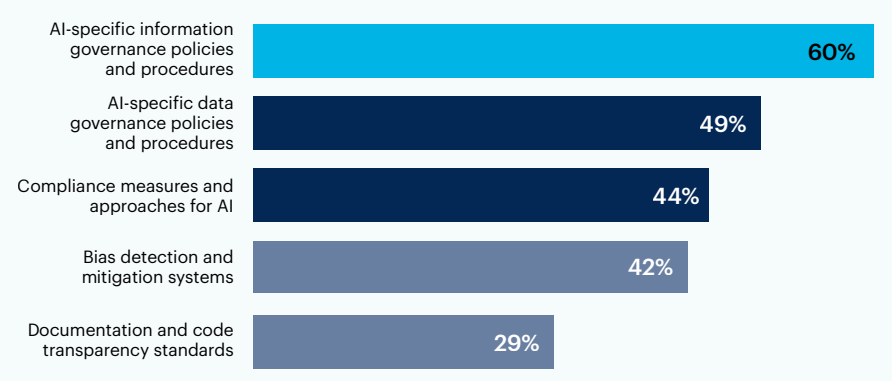
Explainability and interpretability standards 24% | Model training standards 21% | Strategy to train employees on responsible AI and AI governance policies 19% | Scope of AI governance (which use cases will or won’t be governed) 18% | Provisions for releasing minimum viable products (MVPs) 14% | Shared understanding of AI models 14% | Version control requirements 14% | System for AI value assurance and model risk management 13% | Standardized collaboration and documentation tools for data scientists 10% | Other 0%
Respondents who answered “Yes, we have a dedicated AI governance framework” or “Yes, we have extended other governance frameworks into AI-specific approaches” to the question “Does your organization have an AI governance framework implemented?”; Excluding those who selected “None of these”
65% of leaders with an AI governance framework (n = 91) have identified accountability and decision rights for algorithms in their AI governance framework. 59% have 65% covered the roles and responsibilities for escalation procedures.
What roles and responsibilities have you identified in your AI governance framework? Select all that apply.
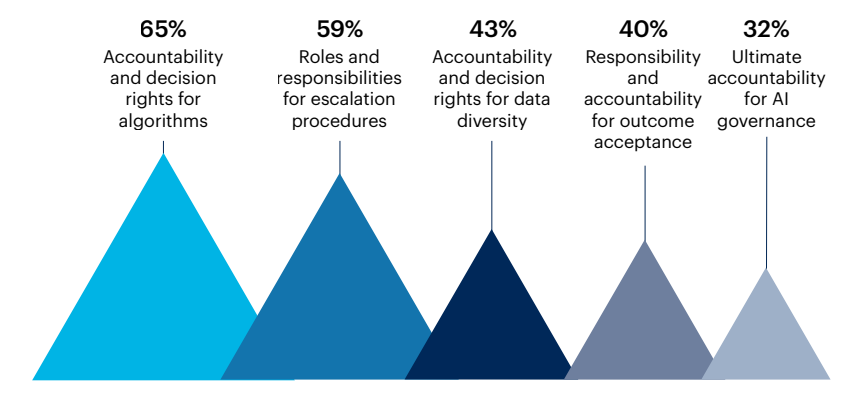
AI compliance & risk management team 27% | AI oversight committee 27% | AI validators & auditors 19% | AI ethics board 20% | Other 0%
Respondents who answered “Yes, we have a dedicated AI governance framework” or “Yes, we have extended other governance frameworks into AI-specific approaches” to the question “Does your organization have an AI governance framework implemented?”; Excluding those who selected “None of these”
Where AI governance frameworks are implemented, AI governance has resulted in more successful AI initiatives, improved customer experience and increased revenue
Among those with an AI governance framework in place who identified positive impacts of AI governance at their organization (n = 71), 48% say their organization has experienced more successful AI initiatives. Other positive impacts of AI governance that many leaders identified include improved customer experience (46%), increased revenue (46%) and improved employee experience (36%).
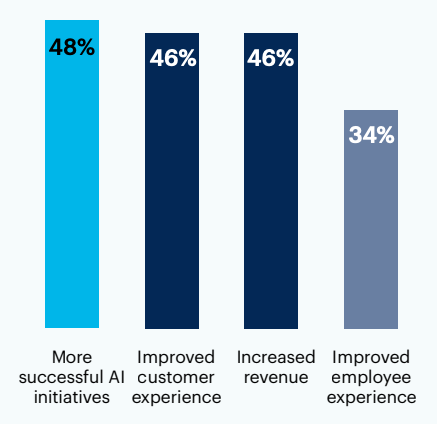
What positive impacts has your organization experienced as a result of AI governance? Select all that apply.
Decreased costs 30% | Improved company/brand reputation 28% | Minimized misinterpretations of AI results 25% | Catalyzed innovation in AI 11% | Other 0%
n = 71
Respondents who answered “Yes, we have a dedicated AI governance framework” or “Yes, we have extended other governance frameworks into AI-specific approaches” to the question “Does your organization have an AI governance framework implemented?”; Excluding those who selected “We have not experienced any positive impacts”, “Too early to tell” or “Not sure”
The greatest opportunities with properly governed AI technology
Question: What do you see as the greatest opportunities with properly governed AI technology?
Improving the extent and quality of data extraction and insights from non-traditional sources like unstructured text, images, audio and video.
AI is a game changer in ITES [information technology enabled services]. Effective AI governance model will help data protection, compliance and regulatory approval and business values. A secured AI deployment will increase customer confidence which ultimately will help in increased business opportunities.

Want more insights like this from leaders like yourself?
Click here to explore the revamped, retooled and reimagined Gartner Peer Community. You'll get access to synthesized insights and engaging discussions from a community of your peers.
Respondent Breakdown
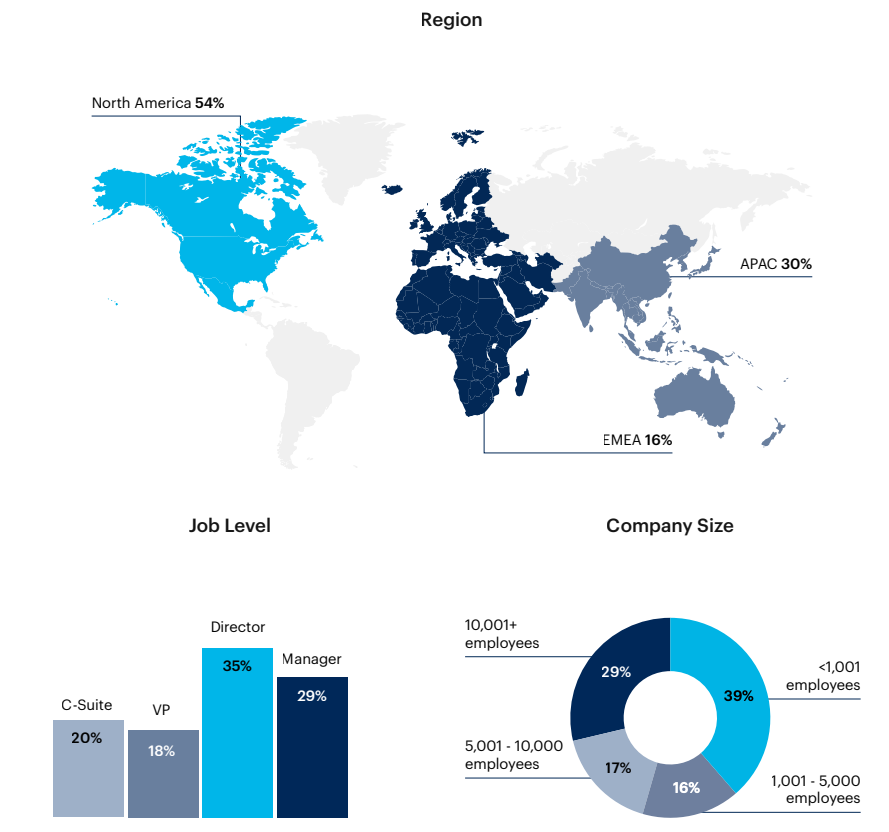
Note: May not add up to 100% due to rounding
Respondents: 200 IT and Data and Analytics leaders involved in decisions around AI strategy at their organization who have addressed or plan to address AI through a governance framework